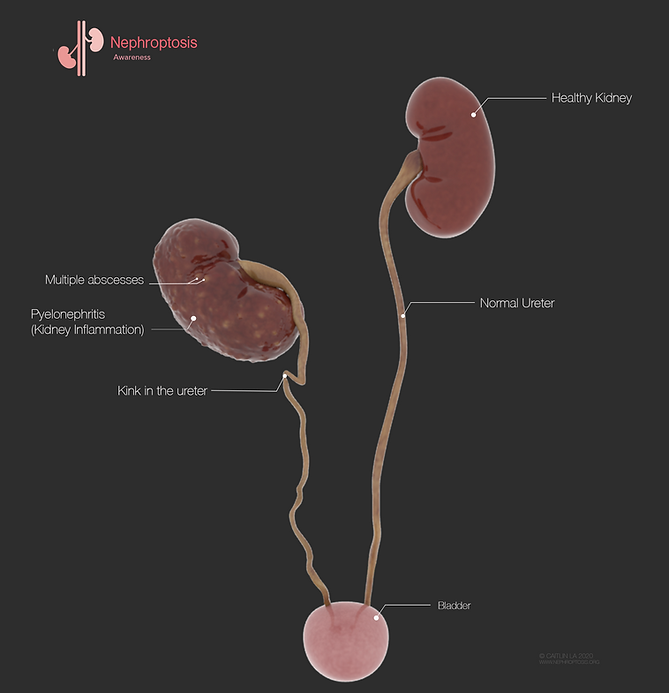DOES NEPHROPTOSIS EFFECT THE BLOOD FLOW TO THE KIDNEYS?

-
When the kidney is in a prolapsed position due to nephroptosis this causes elongation and stretching of both the renal artery and vein causing a reduction in blood flow to the kidney.
-
When the kidney does not receive the usual blood supply from the renal artery it cannot function as efficiently. Due to the kidneys reduced blood supply this can sometimes cause high blood pressure in certain patients, especially when in an upright position.
-
As the kidneys blood is drained from the renal vein, when the kidney is in a prolapsed position, blood cannot be drained efficiently which can cause a build up of pressure within the kidney.
DOES NEPHROPTOSIS EFFECT THE FUNCTION OF THE URINARY TRACT?
.png)
-
In a normal functioning urinary tract after urine is expelled from the kidneys it then moves down the ureters to reach the bladder where it is stored until a person needs to urinate.
-
When the kidney is in a prolapsed position this can cause an obstruction or kink in the ureter.
-
If there is a kink somewhere along the length of the ureter urine cannot drain properly from the kidney to the bladder.
-
When urine cannot drain properly from the kidney it can cause swelling due to the build up of urine. If this happens this is a secondary complication of nephroptosis called Hydronephrosis.
-
Individuals with nephroptosis can be at higher risk of hydronephrosis due to a kink or obstruction in the ureter which happens when the individual is in an upright position.
WHAT DOES HYDRONEPHROSIS LOOK LIKE?

.png)
SYMPTOMS OF HYDRONEPHROSIS
-
Pain in the abdomen, back side or groin
-
Blood in the urine
-
Urinating less than usual
-
Fever
-
Nausea
-
Vomiting
-
Urinary Tract Infection symptoms such as painful urination and cloudy urine
CAN NEPHROPTOSIS CAUSE INFECTIONS OF THE KIDNEY?

-
Nephroptosis can increase the risk of a kidney infection called Pyelonephritis which causes inflammation throughout the kidney.
-
An infection of the kidney is usually due to a bacterial infection which usually starts in the bladder (cystitis) and spreads up towards the kidneys.
-
Individuals with nephroptosis can develop pyelonephritis due to intermittent obstructions of the urinary tract. When urine cannot be expelled from the kidney in the usual way bacteria can form within the urinary tract as a result causing an infection.
SYMPTOMS OF PYELONEPHRITIS
-
Pain in the abdomen, back, side or groin
-
Fever
-
Chills
-
Nausea
-
Vomiting
-
Frequent painful urination
-
Blood in the urine
-
Dark or cloudy urine
